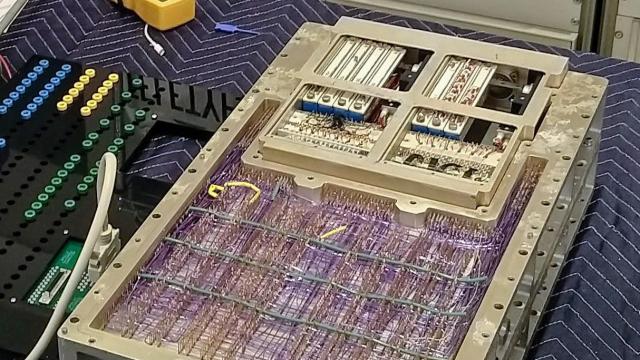Ken Shirriff is a hardware hacker who also has a penchant for restoring old computers, including the Xerox Alto, which had a huge influence on Steve Jobs and the Macintosh computer. His latest project was bringing one of NASA’s Apollo-era guidance computers back to life, but without a visit to the Moon on his horizon, Ken instead used the machine to mine bitcoin.
Developed in the ‘60s by NASA to be used as the primary computer for controlling the guidance and navigation systems on the Apollo spacecraft, the Apollo Guidance Computer (AGC) was one of the first computers to use integrated circuits; instead of being the size of an entire room, it squeezed into a box just a couple of feet in size.
The AGC didn’t have a processor inside as we know it, but it instead used around 5,600 electronic gates that allowed it to perform roughly 40,000 simple mathematical additions every second. By today’s standards, that is beyond primitive, but it was enough to allow for real-time control of the Apollo vehicles while being durable enough to survive the rigors of a space launch.
Doing something you love and making money from it is the ultimate pursuit, so after rebuilding and restoring an authentic AGC, Shirriff reprogrammed it to mine bitcoin—a stark departure from its wrangling of data from hundreds of sensors and rocket thrusters, as NASA originally designed it to do. He managed to pull it off, but there’s little chance Shirriff is going to be able to enjoy an early retirement from his most recent hack.
Instead of relying on a single main computer controlled by one organisation, the bitcoin system uses virtual ledgers called blocks to store information about transactions and ownership of the virtual currency on thousands of computers around the world. Blocks are mined—or made official—about every 10 minutes but require a massive amount of computing power as another way to ensure the mining process isn’t taken over by a single organisation or machine.
The process involves generating trillions of random numerical sequences until the correct one is found, which results in a block being successfully mined. It’s a pursuit that’s as random as the lottery, but finding one of those special sequences, also referred to as a hash, currently nets the miner 12.5 new bitcoins, which is worth over $US157,000 ($226,610) as of today. The more computers you can dedicate to the task of generating those random hashes, the better your odds are of hitting it rich.
So there’s a good reason the bitcoin mining community hasn’t enlisted the services of a 50-year-old computer. For about $US70 ($101) you can get a basic bitcoin mining machine on a USB stick that can calculate 130 billion hashes every second. (Some bitcoin miners use entire data centres to mine the cryptocurrency.) The Apollo guidance computer, by comparison, took a little over 10 seconds to generate just a single hash. At that speed, Shirriff calculated, it would “…take the AGC 4×10^23 seconds on average to find a block.” That’s about a billion times as long as the entire age of the universe, which scientists have calculated to be around 13.8 billion years old.
There’s a chance Shirriff could get extremely lucky and happen upon the next hash after just a few minutes of number crunching. But in reality, it probably would take the machine well over a quintillion years (a billion billion) to strike pay dirt. But since the Apollo guidance computer can’t play Doom or even Pong, and NASA has long since upgraded its hardware, this is still probably the most practical task this 50-year-old hardware can be used for.
